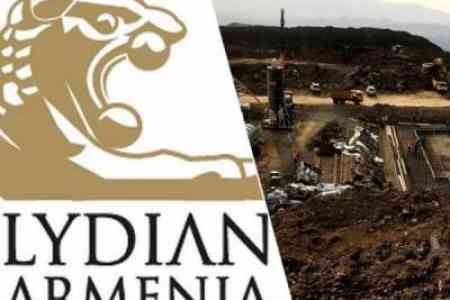


ArmInfo.The European Bank for Reconstruction and Development (EBRD) today announced the completion of its participation in the development of the Amulsar gold mine, the construction of which has been blocked by environmental activists and residents of nearby communities for about two years.
Earlier this year, Lydian International, a mining company that was in dire financial straits, announced a restructuring and was delisted from the Toronto Stock Exchange.
To note, the European Bank for Reconstruction and Development initially took part in the capital of the Lydian International offshore company, registered in Jersey, together with the International Finance Corporation (IFC), which withdrew from the project 2 years ago. The participation of these international donor partners allowed the offshore company to enter the Canadian exchange market and attract additional investment from institutional investors in the form of investment and pension funds. As of today the main lenders remain Orion Resource Partners, Osisko Mining and Resource Capital.
"The EBRD should issue a public statement in which it will express its position on the project and current events," Fidanka McGrath, a senior official of the Bank said. She believes that current events around the mine are causing significant reputational damage to the EBRD, even after the EBRD's stake in Lydian International is liquidated.
The total cost of the Amulsar project is $ 370 million. The life of the mine was envisaged in 10 years and 4 months, while in the annual section it was planned to produce an average of 200 thousand ounces of gold.
The Amulsar mine is the second largest in Armenia. According to the company, the deposit contains about 73,733 kg of gold with an average grade of 0.78 g per tonne, and 294.367 tonnes of silver with an average grade of 9.29 grams per tonne. It is located in the south-east of the country, 13 km from the resort town of Jermuk, between the rivers Arpa and Vorotan. To note, despite the assurances of the Lydian company that about $ 300 million has already been invested in the project for the development of the Amulsar gold mine, environmentalists do not share the government's enthusiasm for the attractiveness of the mine's development plan. Environmentalists fear that the use of sodium cyanide at the mine could lead to water oxidation in rivers. Polluted waters will become unsuitable for drinking and irrigation and can cause irreparable harm to the mineral springs of Jermuk and the ecosystem of Sevan.
The Lydian company itself considers the blockade of the mine illegal and accuses the Armenian government of inaction. In March 2019, the company notified Armenia of a potential international arbitration dispute under bilateral investment treaties between the UK and Canada over what it calls the Armenian government's ongoing campaign against Lydian's investments in Armenia. Lydian says it has followed the highest international mitigation and environmental standards as required by the EBRD, which has invested in the company since 2009. "There is no environmental problem here, it has turned into a political problem," Hayk Aloyan, director of Lydian Armenia said. "The whole world is watching the situation in Armenia, where the most environmentally friendly investment project in the mining industry has become hostage to political games." Head of the Armenian office of the European Bank for Reconstruction and Development (EBRD) Dmitry Gvintadze said at the end of January that the Armenian government, in the end, must make a final decision on the Amulsar project. The specific share of the EBRD in the company's capital has not been disclosed, but according to Gvintadze it is small.